
Sowing the Seeds of a Tropical Village Economy in the Mountains of Sumatra
This piece is a set of reflections from Jeff Conant, International Forests Program Director, during a recent trip to Indonesia to meet with local village communities.

The village of Air Pahlawan in Sumatra, Indonesia sits amid steep jungled hills two hours’ ride by motorbike up long slopes from the sprawling shore of the Indian Ocean. Home to several dozen families, some whose roots are here and others whose parents or grandparents migrated from West Java in search of fertile land, the villagers of Air Pahlawan live on what they grow in jungle-shaded upland forest gardens: cassava, coconut, durian, rambutan, ginger, coffee, cacao, pepper, chili, betel nuts. Their lush gardens are watered by Sumatra’s frequent rains and the constant moisture of low clouds that sweep in quickly off the ocean. Their homes are painted in celebratory colors – sky blue, lime green, the deep red of mature coffee fruit, and illuminated by electric lights powered by a micro hydro plant they built themselves. It may be this element that gives the village its name, Air Pahlawan, which translates roughly as “Hero of Water.”





Even as the village seems self-sufficient in food and energy, things could be better. The coffee trade is controlled by middle men who set the price at whim – the current rate is about $1 a kilo for coffee that may sell for ten times that in Europe or the U.S. – forcing the villagers to sell their coffee at a loss. Cash is needed to buy rice, medicine and cooking fuel from the coast and to power the motorbikes that can get their crops to market and the farmers to their forest gardens among the slopes and valleys. Exploited by their coffee buyers, much of Air Pahlawan is in a debt trap, forced to continue selling to profiteering buyers, essentially indenturing themselves to the coffee trade.
It’s that debt, as much as their lush forest gardens, that brought me here for a brief visit accompanying Zenzi Suhadi, Executive Director of WALHI, or Friends of the Earth Indonesia, the country’s oldest, and largest, environmental advocacy group. A field biologist by training and a community organizer by instinct, Zenzi is soft-spoken but loquacious, engaging the villagers for hours in inspired discussions: we need to create cooperatives to strengthen our village economies, he says; we need to develop a tropical ecological economy that can supply coffee and luxury spices – cloves, cardamom, pepper – to the world market at a price we deserve, he exhorts them. Imagine a coffee shop in New York City with durian coffee from your village, he says, gently weaving his hands in the air. Imagine your betel nuts sold as medicine in China, your cardamom sold for fair trade prices to the specialty shops in Sydney and San Francisco.

Zenzi speaks only very basic English and I speak no Indonesian, but I have had rich conversations with him on four continents – at a Friends of the Earth International convening in Cameroon, where he first shared with me some of the ideas he’s advancing as director of WALHI; in Washington DC, where I arranged for him to speak at a Senate briefing on tropical deforestation; in Lyons, France where we sat together on a panel about financial crime and corruption in the Indonesian palm oil industry at the headquarters of INTERPOL; in New York at the Ford Foundation and the Metropolitan Museum of Art; at my home in California where he brought gifts for my daughters and taught me to roast green coffee beans in a skillet. But I’ve been most impressed by him in the villages of his home province, where I’ve had the good fortune to travel with him briefly, twice.
Slim and tall with soft, vaguely feminine features and a quick smile, Zenzi is the son of a traditional healer and martial arts master from a small town in Bengkulu Province, a long slice of coastal rainforest on the southeast face of Sumatra. It’s a land rich in endemic species – gibbons and rhinos and the famous Rafflesia arnoldii, the largest flower in the world, so beloved by locals that the image of the giant floppy-pedaled flower appears on textiles, t-shirts, and as enormous concrete monuments in traffic roundabouts as you drive the chaotic streets. Bengkulu is still home to extensive stretches of pristine jungle, and Zenzi often jokes with me, grinning with delight, that I must come with him to sleep out in the forest and shake hands with the Sumatran tiger.

As a young student of biology, Zenzi’s first love was orchids. “Big diversity of orchids,” he told me in halting English on a flight from Jakarta when we first met, “indicates healthy jungle.” Orchids led him to activism against one of his country’s most pernicious environmental catastrophes – the ruthless and apparently unstoppable expansion of industrial palm oil plantations. Across the archipelago, from Aceh in the west to Papua in the east, Indonesia has over 63,000 square miles of palm oil plantation, every inch of it on land that was once rainforest and carbon rich peatland. “Inside the plantations,” Zenzi told me on that flight as we peered down on a vast thorny carpet of tightly clustered oil palms spreading across the landscape, “only one kind of orchid. This is the same orchid we use in in medicine to remove poison from the body. This tells me that oil palm tree is toxic to the jungle.”

His disgust for the monoculture of oil palm led him to organize against the plantations, and later against paper pulp plantations, against mining, and, lately, propelled him into the leadership of WALHI. More a grassroots social movement than an environmental organization in the western sense, WALHI has offices in 28 provinces, thousands of volunteers, deep political ties, and an ambitious vision of ecological justice befitting the organization’s broad reach.
I spent only one day and one night in Air Pahlawan. After driving an hour uphill from the coast road, the pavement turned to dirt, and after tortuous curves on steep slopes the dirt road ended at a cluster of rough-sawn board shacks, some of them hung with rusted birdcages and selling essential goods like cooking oil, coffee and soap. From there the road turned to slick mud paths passable only on foot or by dirt bike. As the going grew increasingly treacherous, Zenzi turned to me from time to time and inquired simply, “Ok?” With a thumbs-up, I walked the cable bridge with rotted boards over a river gorge; with another thumbs-up I mounted the back of a dirt bike driven by a man whose name I wouldn’t learn because we didn’t share a common tongue. When our motorbike crossed a second cable bridge traversed by thin planks, roaring two hundred feet above a second gorge, Zenzi was nowhere in sight, and by then it didn’t matter whether I was ok because we had arrived at Air Pahlawan.

In the village we were welcomed warmly in the traditional manner with soft handshakes, pressing the head to the hand or the hand to the heart, followed by an abundance of food, coffee and clove-infused cigarettes, a lot of smiles and laughter, and a flurry of selfies with me, the first foreigner that most villagers had ever met.
After the initial formalities, we took a walk out of the village center to see their cultivated lands. In contrast to the monoculture of oil palm that dominates the landscape elsewhere, the villagers of Air Pahlawan cultivate a multi-layered tree polyculture: coffee trees grow under the shade of nitrogen-fixing petai bean and coconut; pepper vines climb up cocoa trees on slopes bordered by ginger and cassava; mango, guava, and banana spread across hillsides mixed with chili pepper and other annual vegetable crops; a few oil palms and betel nut trees blend into the natural forest canopy, providing habitat for all the varied wildlife of the rainforest. In the jargon of agriculture this would be called agroecology or agroforestry, where the benefits of diverse intercropping provide greater resilience than reliance on industrial pesticides and fertilizers and where the practice of mixing perennial tree crops with annual production amplifies the benefits of natural biodiversity and maintains the health of the forest. Of course, for the farmers of Air Pahlawan it’s not an exercise in modeling a particular form of ecological forest management – it’s just what they do.
Passing through their cultivated area we followed down a muddy track into the jungle, and came upon a narrow concrete channel alongside the path with fast-moving water rushing through. After some time, the channel ran to the edge of a steep downward slope where it disappeared into the brush – this was the penstock of their micro-hydro system, where the fast-flowing water rushes downhill to be shunted into a turbine at the bottom to generate power into cables strung through the trees and back to the village. After running through the turbine the water splashed back out of the system and into a free-flowing creek. I was told that micro-hydro is not uncommon in the region, as abundant water and steep limestone slopes bless the rough terrain with the basic ingredients of one of the world’s cleanest and most renewable sources of electricity.
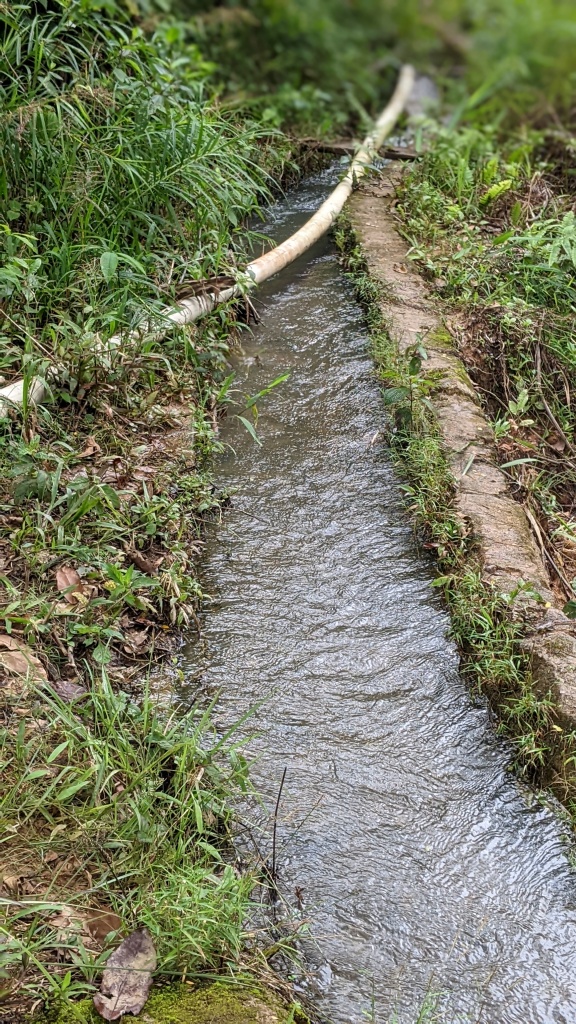

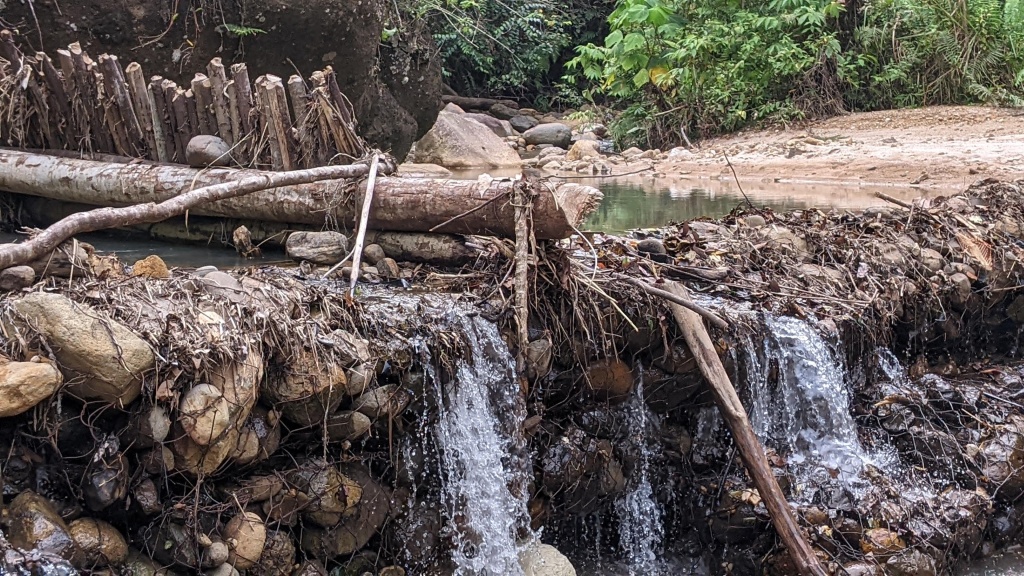

Their agroforestry system and their renewable energy system construe another benefit, if they’re able to capture it: by generating and powering their own subsistence economy, the villagers make a living. Simple as it sounds, this also means they are not compelled to join millions of others forced to migrate for work on the palm oil plantations or in the cities; conversely, it gives them a strong incentive to keep the industrial plantation companies from encroaching on their land and destroying their forest. In effect, maintaining the land for their own sustainable use and keeping control of their energy and their labor makes the villagers of Air Pahlawan not just heroes of water, as their village name notes, but heroes of climate, as their livelihoods are as carbon neutral as it is possible to be.
As I lay on a thin mat on the floor of my host’s house to sleep that night, Zenzi sat on the porch with several men, smoking and talking into the wee hours. In his gentle way he was persuading them of the importance of creating a coffee and spice cooperative to take control of their village economy – a vision that is key to what he hopes to carry out during his tenure at the helm of WALHI. He calls the vision Ekonomi Nusantara, using the precolonial name of the Indonesian archipelago, though he thinks perhaps it needs a more common name, like “tropical village economy,” that westerners can comprehend. Zenzi’s sense of politics is too keen, however, to have any illusion that Ekonomi Nusantara can grow merely be means of local cooperatives tapping into global markets – it needs to be cultivated in lands legally owned and ecologically managed by the villagers themselves. In a country ruled by oligarchs and often strangled by a bloated and corrupt government bureaucracy, this means widespread agrarian reform fueled by a peasant movement demanding land back, village by village and plantation by plantation – a vision that WALHI promotes under the innocuous-sounding name, “Community Area Management.” And the tropical village economy needs to be fertilized by a wide-awake generation of youth, trained ay ecological training centers in every province.

One such school exists today at WALHI’s center in Bogor, a lush university town in the volcanic hills outside of Jakarta. It was there, just a few days before our visit to Air Pahlawan, that Zenzi took advantage of WALHI’s annual anniversary celebration to float the idea by Ms. Siti Nurbaya Bakar, the Indonesian Minister of the Environment and Forestry. Ever strategic, he had already seeded the notion with her in advance, and the Minister responded enthusiastically. In her speech at WALHI’s 42nd anniversary event, she announced a gift to the organization – the state would grant WALHI a hundred hectares of forested land in Bogor to expand their first ecological training center, and another hundred hectares in each of the twenty-eight provinces where WALHI works.
When I asked Zenzi if they would devote these forest sites to conservation research he retorted, “Not only research. Conservation production. We will cultivate the forest and sell the products.” This is the heart of Ekonomi Nusantara – the recognition that forest conservation doesn’t mean shutting off access to the forest for western style “fortress conservation,” but partnering with the forest to harvest and sell non-timber forest products in order to fund their training centers and further empower local communities.
Returning to the coast after the visit to Air Pahlawan, Zenzi brought me to see the research center he’s established in his own home. He had constructed a few small greenhouses of bamboo and plastic sheeting which contained betel nuts in various states of drying; an adjacent shed contained a large machine he’d imported from India to shell the nuts. While a video team filmed us for a documentary promoting Ekonomi Nusantara, Zenzi told me that betel nut is high in fluoride, which is extracted for toothpaste, and is widely used as a cure for infertility in China, along with its common use as a stimulant throughout Asia. With his simple processing plant he had begun purchasing the nuts from local farmers, and encouraging them to harvest only the best nuts at the right time to fetch the best price in the global market. In this way he improved the livelihoods of his neighbors, who previously harvested the nuts en masse and sold them to Chinese traders who came through the villages, at whatever price was offered. Betel trees, I learned, are endemic to the region – in the local language they are called “Bengka.” Combined with “Ulu,” an Indonesian word meaning “land’s end,” the nuts give Zenzi’s home province, Bengkulu, its name – Place of the Betel Nut. Thus Zenzi’s pet project promised not only to bolster the local agrarian economy, but to instill in local farmers a sense of pride in the land and its gifts.

As I returned to Jakarta from just a few days in the Sumatran rainforest, Zenzi’s vision consolidated in my head: halt the expansion of the oligarch-controlled industrial plantation economy, turn land back to those who can produce from it, train an army of youth to see themselves as ecological stewards and return to the countryside, grow an economy in the forest gardens of the villages like Air Pahlawan, controlled by the villagers themselves, and do it all in a way that honors the precolonial dignity of this land’s natural wealth. At a moment when the global climate emergency is sinking coastal cities, igniting conflagrations in the world’s forests, driving massive floods and searing droughts, and sending caravans of migrants in search of safety, security and a livable future, Zenzi’s vision, broad and ambitious, but realizable by a wide-reaching social movement organization like WALHI, appears as a shining ray of hope.
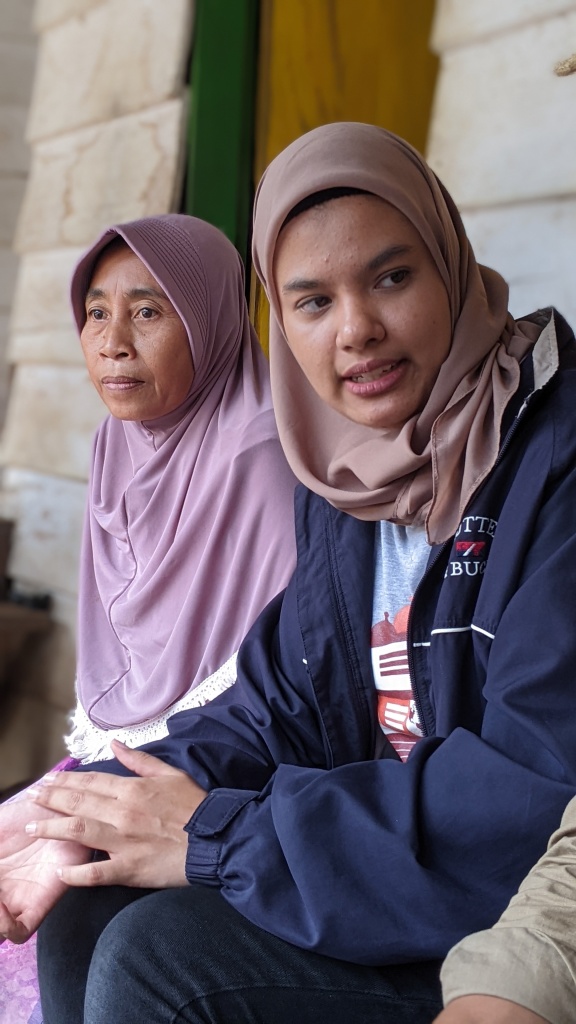


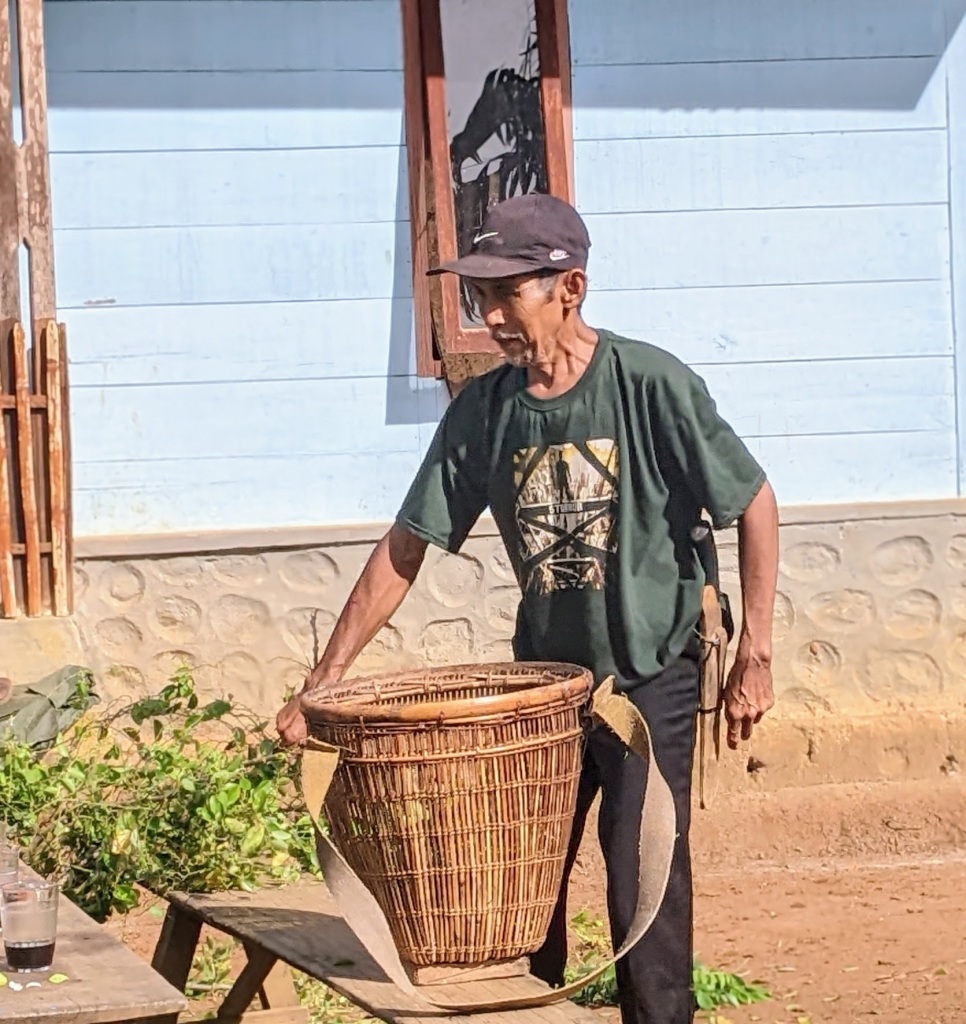


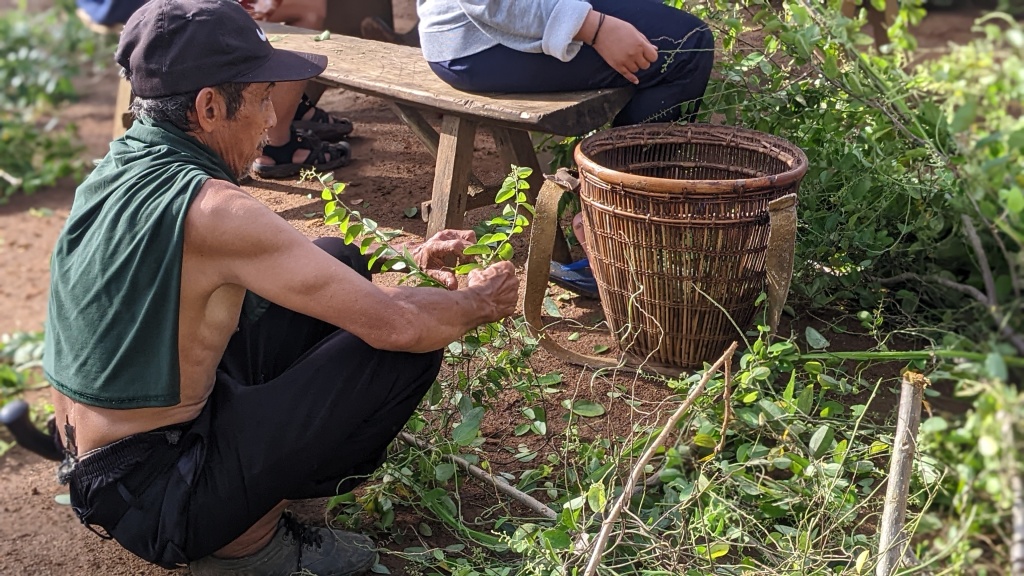



To view more photos from Air Pahlawan in Sumatra, go to: https://jeffconant.com/portfolio/
Related Posts
Ways to Support Our Work

Read Latest News
Stay informed and inspired. Read our latest press releases to see how we’re making a difference for the planet.

See Our Impact
See the real wins your support made possible. Read about the campaign wins we’ve fought for and won together.

Donate Today
Help power change. It takes support from environmental champions like you to build a more healthy and just world.
